-
Bitmask support for precise image segmentation
We’ve introduced a new BitMask tag to support pixel-level image annotation using a brush and eraser. This new tag allows for highly detailed segmentation using brush-based region and a cursor that reflects brush size down to single pixels for fine detail. We’ve also improved performance so it can handle more regions with ease.
Additionally, Mac users can now use two fingers to pinch zoom and pan images for all annotation tasks.
New email notifications for project events
Email notifications have been added for important project events, including task assignments, project publishing, and data export completion. This helps annotators and project managers stay in sync without unnecessary distractions.
Users can manage email preferences in their user settings.

AI Assistance now available for all SaaS users
All Label Studio Starter Cloud and Enterprise SaaS users, including those on a free trial can ask inline questions of an AI trained on our docs and even use AI to quickly create projects, including configuring labeling UIs, with natural language.
Account owners can enable the AI Assistant in the Settings > Usage & Licenses by toggling on “Enable AI” and “Enable Ask AI.” For more information see the docs.

Bug fixes and improvements
- Fixed annotation history not saving when target storage fails; now handled via worker jobs for improved performance when clicking Accept/Reject buttons.
- Excluded postponed drafts from label streams and quickview to prevent user confusion.
- Fixed inconsistent task counters and background worker memory issues in Starter Cloud.
- Resolved issues with toggling UI settings and duplicated roles in filters.
- Fixed homepage UI bug with element collisions at half-width.
- SDK improvements: added JWT proxying, token exchange, and support for external workflows.
- Fixed webhooks for bulk labeling: ANNOTATION_CREATED event is sent during bulk labeling.
- Improved large PDF handling in Prompts.
- Addressed race condition in user pausing by annotator evaluation.
- Fixed order by comments when it led to duplicate tasks in the data manager
-
Spectrogram support for audio analysis
There is a new option to display audio files as spectrograms. You can further specify additional spectrogram settings such as windowing function, color scheme, dBs, mel bands, and more.
Spectrograms can provide a deeper level of audio analysis by visualizing frequency and amplitude over time, which is crucial for identifying subtle sounds (like voices or instruments) that might be missed with traditional waveform views.

Group multiple time series in one channel
There is a new Multichannel tag for visualizing time series data. You can use this tag to combine and view multiple time series channels simultaneously on a single channel, with synchronized interactions.
The Multichannel tag significantly improves the usability and correlation of time series data, making it easier for users to analyze and pinpoint relationships across different signals.
Annotation summary by task
When using the View All action, users who are in the Reviewer role or higher can now see a summary of the annotations for a specific task. This summary includes metadata, agreements, and side-by-side comparisons of labels.
You can use this summary for a more efficient and detailed review of annotated tasks and to better understand consensus and discrepancies, especially when needing to compare the work of multiple annotators.

Filter on annotation results
When applying filters, you will see new options that correspond to annotation results.
These options are identified by the results chip and correspond to control tag names and support complex filtering for multiple annotation results. For example, you can filter by “includes all” or “does not include.”
This enhancement provides a much more direct, predictable, and reliable way to filter and analyze annotation results, saving time and reducing the chances of errors previously encountered with regex matching.
For more information, see Filter annotation results.


Enhanced delete actions from the Data Manager
When deleting annotations, reviews, or assignments, you can now select a specific user for the delete action. Previously, you were only able to delete all instances.
With this change, you will have more granular control over data deletion, allowing for precise management of reviews and annotations.
This enhancement is available for the following actions:
- Delete Annotations
- Delete Reviews
- Delete Review Assignments
- Delete Annotator Assignments

Email notifications for invites
Users can now opt into email notifications when you are invited to a project or workspace. These options are available from the Account & Settings page.
This ensures users are promptly aware of new project and workspace invitations, improving collaboration and onboarding workflows.

Enhanced control and visibility for storage proxies
There are two UI changes related to storage proxies:
- On the Usage & License page, a new Enable Storage Proxy toggle allows organization owners to disable proxying for all projects within the organization. When this setting is disabled, source storages must enable pre-signed URLs. If they are not enabled, the user will be shown an error when they try to add their source storage.
- On the Source Storage window, the toggle controlling whether you use pre-signed URLs now clearly indicates that OFF will enable proxying.


Usage & License page visibility
The Billing & Usage page has been renamed the Usage & License page. Previously this page was only visible to users in the Owner role. A read-only form of this page is now available to all users in the Admin role.

Session timeout configuration
Organization owners can use the new Session Timeout Policies fields to control session timeout settings for all users within their organization. These fields are available from the Usage & License page.
Owners can configure both the maximum session age (total duration of a session) and the maximum time between activity (inactivity timeout).

UX improvements- The Data Import step has been redesigned to better reflect the drag and drop target. The text within the target has also been updated for accuracy and helpfulness.

- The empty states of the labeling interface panels have been improved to provide user guidance and, where applicable, links to the documentation.

-
Time series synchronization with audio and video
You can now use the sync parameter to align audio and video streams with time-series sensor data by mapping each frame to its corresponding timestamp.
For more information, see Time Series Labeling with Audio and Video Synchronization.
Improved grid view configurability
You can now configure the following aspects of the Grid View in the Data Manager:
- Columns
- Fit images to width

Bug fixes
- Fixed a number of UI issues affecting whitelabel customers.
- Fixed an issue where resolved and unresolved comment filters were not working due to a bug in the project duplication process.
- Fixed an issue where some non-standard files such as PDFs were not correctly displayed in Quick View if using nginx.
- Fixed an issue where prediction counts were not always updating correctly when updating or re-running Prompts.
- Fixed an issue where NER entities were misplaced when using Prompts.
- Fixed an issue where PDF files could not be imported through the Import action.
- Fixed an issue where the step parameter on the <Number> tag was not working as expected.
- Fixed an issue where incorrect fonts were being used in the Labeling Interface settings.
- Fixed an issue where filters created in a project that had been duplicated would be shared back to the original project.
- Fixed an issue where annotator limit and evaluation settings were not kept when duplicating projects.
- Fixed an issue where time series data was not properly displayed via the playground.
- Fixed an issue where file extensions and file sizes were not being properly filtered when importing via URL.
- Fixed an issue where the API call for rotating tokens was not setting the expiration correctly on new tokens.
-
Download full comment text through the SDK
Previously when exporting task information using the SDK, comment text was truncated at 255 characters. Now, you can export the full comment text when using the following:
tasks = list(ls.tasks.list(<PROJECT_ID>, fields="all"))UI improvements for the workspace list
Improved the scrolling action for the workspace list, making it easier for orgs with very large workspace lists.
Security
Made security improvements around webhook permissions.
Bug fixes
- Fixed an issue where tasks were not being updated as complete when reducing the task overlap.
- Fixed an issue with the wrong logo appearing when loading screens in a white labeled environment.
- Fixed an issue with email template text for white labeled accounts.
- Fixed an issue where inactive admins would appear in the project members list and could not be removed.
- Fixed an issue where an unwanted
0character appeared in the Quick View when labeling audio data. - Fixed an issue where audio regions would not reflect multiple labels.
- Fixed UI issues associated with dark mode.
- Fixed an issue with CSV exports when the
Repeatertag is used. - Fixed an issue with the Remove Duplicated Tasks action where it failed when a user selected an odd number of tasks.
- Fixed a validation error when updating the labeling configuration of existing tasks through the API.
- Fixed an issue with overflow and the date picker.
-
Support for JSONL and Parquet
Label Studio now supports more flexible JSON data import from cloud storage. When importing data, you can use JSONL format (where each line is a JSON object), and import Parquet files.
JSONL is the format needed for OpenAI fine-tuning, and the default format from Sagemaker and HuggingFace outputs. Parquet enables smoother data imports and exports for Enterprise-grade systems including Databricks, Snowflake, and AWS feature store,
This change simplifies data import for data scientists, aligns with common data storage practices, reduces manual data preparation steps, and improves efficiency by handling large, compressed data files (Parquet).
Playground 2.0
The Label Studio Playground is an interactive sandbox where you can write or paste your XML labeling configuration and instantly preview it on sample tasks—no local install required.
The playground has recently been updated and improved, now supporting a wider range of features, including audio labeling. It is also now a standalone app and automatically stays in sync with the main application.

Tip: To modify the data input, use a comment below the
<View>tags:
New PDF tag for simplified labeling and extended Prompts support
A new PDF tag lets you directly ingest PDF URLs for classification without needing to use hypertext tags.
This also simplifies the process for using PDFs with Prompts, because you no longer need to first convert your PDFs to images.
Interactive view all
The View All feature when reviewing annotations has been improved so that you can now interact with all annotation elements side-by-side, making it easier to review annotations. For example, you can now play video and audio, move through timelines, and highlight regions.
Performance improvements
Two notable performance improvements include:
- Improved response time for the Updated at filter in the Data Manager, preventing timeouts.
- Reduced
/api/usersresponse time, in some cases from P50 > 40s to P50 < 30s.
Bug fixes
- Fixed an issue where some Prompts errors were not properly displayed.
- Fixed multiple UI issues related to the new dark mode design.
- Fixed other small UI issues related to column sizing and padding.
- Fixed an issue where the token refresh function was not using the user-supplied
httpx_client. - Fixed an issue that would cause the Data Manager to crash when interacting with the project link in the navigation bar.
- Fixed an issue where clicking an option on the project role dropdown on the user management modal would cause the modal to close unexpectedly.
- Fixed an issue where users were still able to resize TimeLineLabels regions even if locked.
- Fixed an issue where the COCO export option was appearing even if the labeling configuration was not compatible.
- Fixed an issue where in some situations users were not able to navigate after deleting a project.
- Fixed an issue where exports were included when duplicating a project.
- Fixed an issue which caused workspaces list styles to not apply to the full container when scrolled.
-
Multi-task JSON imports for cloud
Previously, if you loaded JSON tasks from source storage, you could only configure one task per JSON file.
This restriction has been removed, and you can now specify multiple tasks per JSON file as long as all tasks follow the same format.
For more information, see the examples in our docs here.
Include user emails in new Annotations chart CSV export
The Export Underlying Data option was recently introduced and is available from the Annotations chart in the annotator performance dashboard. This allows you to export information about the tasks that the selected users have annotated.
Previously, users were only identified by user ID within the CSV.
With this update, you can also identify users by email.
Bug fixes
- Fixed an issue where the drop-down menu to select a user role was overflowing past the page edge.
- Fixed an issue where the Not Activated role was hidden by default on the Organization page.
- Fixed an issue where when moving around panels in the labeling interface, groups were not sticking in place.
-
Automation and AI-Powered Workflows
Gain visibility into LLM metrics per task
Added customizable column selectors for performance tuning and cost management.
This will help you better understand the data behind each request to the LLM for improved troubleshooting and cost management with Prompts.

Expanded model support for Prompts
Added support for the OpenAI GPT-4.1 series models in Prompts. See the complete list of supported base models here.
Annotation and Review Workflows
Dynamic brush sizes
The cursor now adjusts dynamically to brush size to allow for more precision in segmentation tasks.
KeyPointLabel exports for COCO and YOLO
COCO and YOLO export formats now available for
KeyPointLabels.Team Management and Workforce Insights
New exports available for Annotator Performance metrics
Gain clarity into annotator output and productivity; track performance across individuals and teams.
- Export CSVs of key metrics such as lead time (with and without outliers)
- New Export Underlying Data action for the Annotations chart
- Easier navigation and access to insights
Agreement score popover in Data Manager
Click any agreement score to view pairwise agreement scores with others.
- Understand how agreement is calculated
- Identify labeling misalignment and training opportunities
- Improves trust, transparency, and quality auditing

Infrastructure and Security
Performance improvements at scale
- Significant improvements to import and export performance for larger datasets and teams working at scale.
- Membership API enhancements resulting in faster load times for customers and organizations with a large number of members.
Plugin framework access control
You can now restrict Plugin access to Administrators and above. By default, Managers have access to update plugins.
To request that this be restricted to Administrators, contact support.
Public template library (Beta)
Contribute to and browse the open source community templates repository.
- Find templates for common use cases
- Modify and share templates based on your unique use case
- Gain credit and swag for your contributions
View dozens of pre-built templates available today in the Templates Gallery.
-
Beta features
Dark mode
Label Studio can now be used in dark mode.
Click your avatar in the upper right to find the toggle for dark mode.
- Auto - Use your system settings to determine light or dark mode.
- Light - Use light mode.
- Dark - Use dark mode.
Note that this feature is not available for environments using whitelabeling.

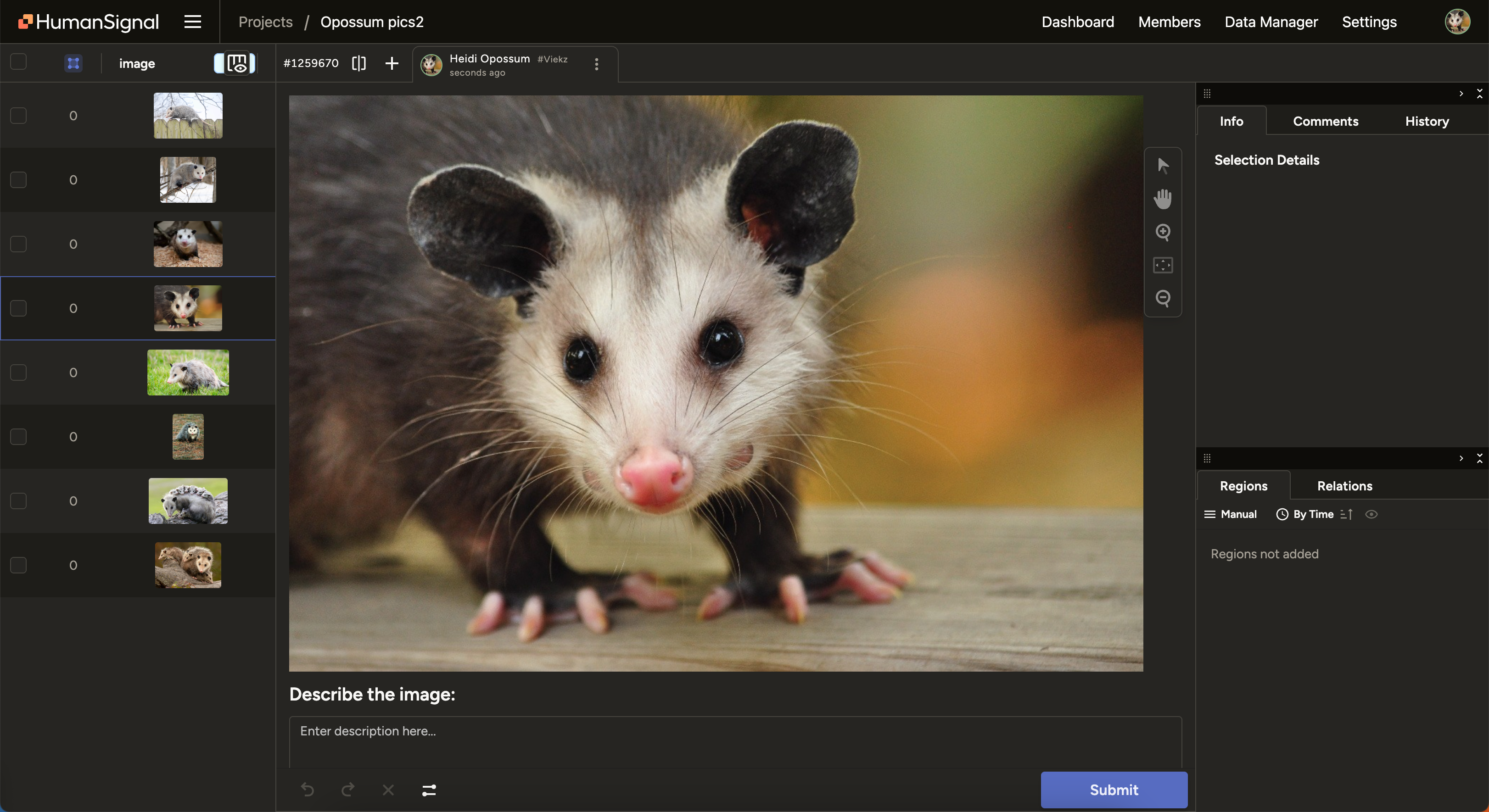
New features
Annotator Evaluation settings
There is a new Annotator Evaluation section under Settings > Quality.
When there are ground truth annotations within the project, an annotator will be paused if their ground truth agreement falls below a certain threshold.
For more information, see Annotator Evaluation.
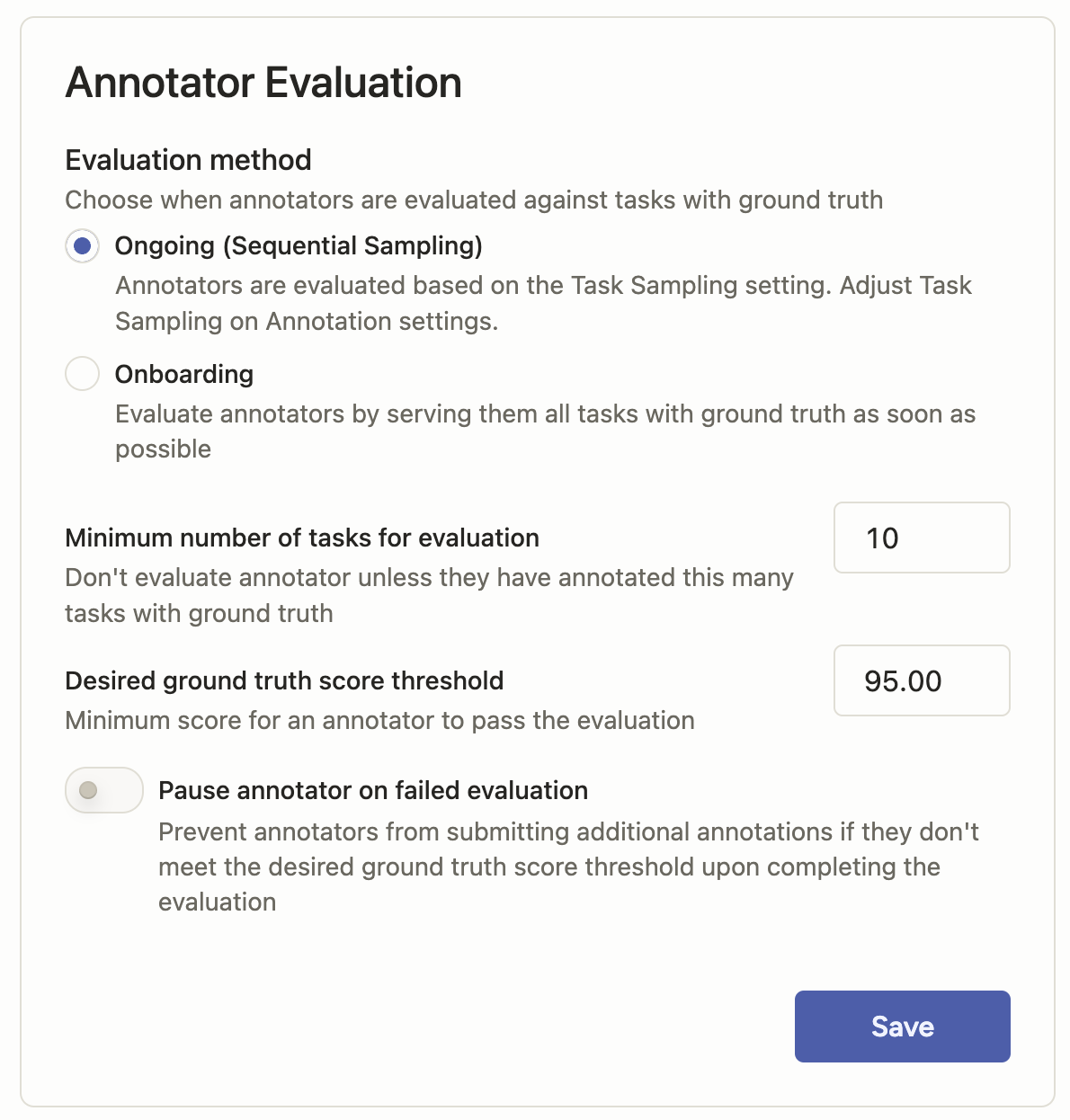
Feature updates
Prompts model updates
We have added support for the following:
Anthropic: Claude 3.7 Sonnet
Gemini/Vertex: Gemini 2.5 Pro
OpenAI: GPT 4.5For a full list of supported models, see Supported base models.
Prompts indicator for pages processed
A new Pages Processed indicator is available when using Prompts against a project that includes tasks with image albums (using the
valueListparameter on an Image tag).You can also see the number of pages processed for each task by hovering over the image thumbnail.
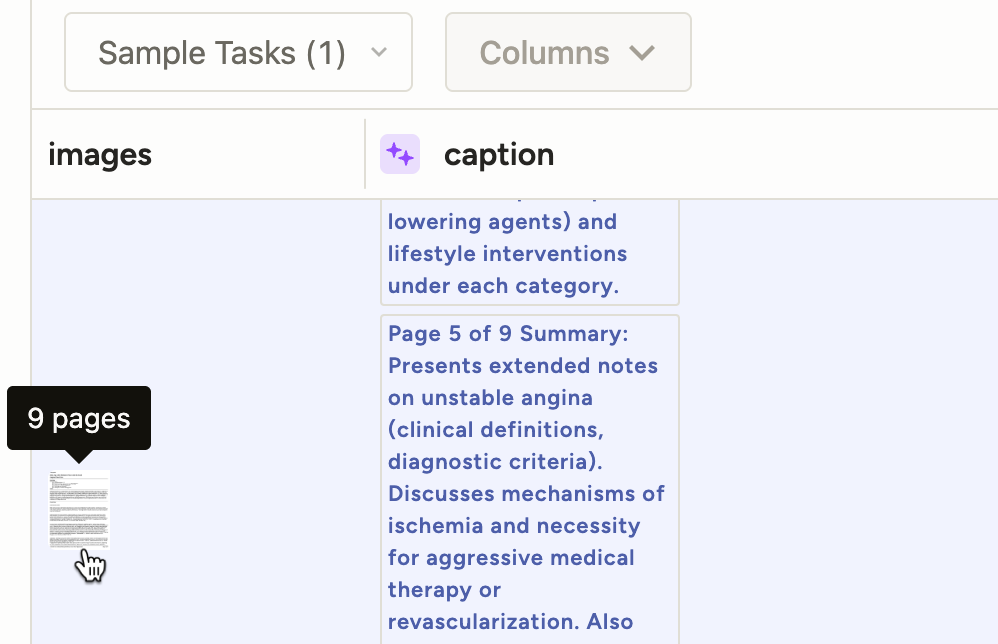
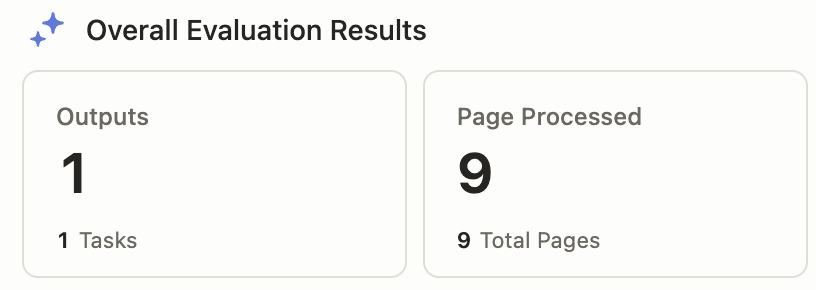
Adjustable text spans
You can now click and drag to adjust text span regions.

Support for BrushLabels export to COCO format
You can now export polygons created using the BrushLabels tag to COCO format.
Create support tickets through AI Assistant
If you have AI Assistant enabled and ask multiple questions without coming to a resolution, it will offer to create a support ticket on your behalf:

Clear chat history in AI Assistant
You can now clear your chat history to start a new chat.
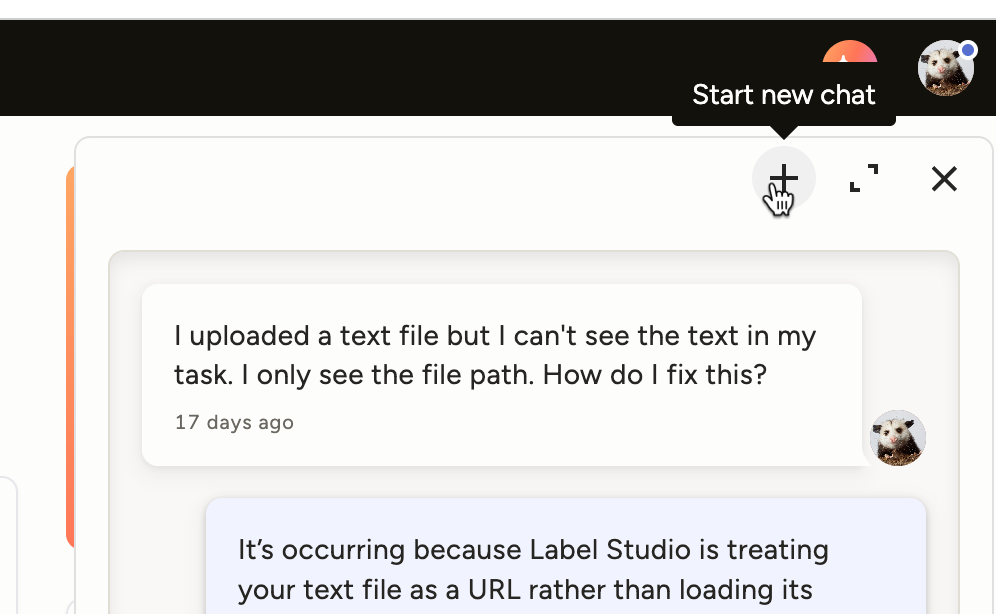
Security
- Addressed a CSP issue by removing
unsafe-evalusage. - Improved security on CSV exports.
Bug fixes
- Fixed a server worker error related to regular expressions.
- Fixed an issue where clicking on the timeline region in the region list did not move the slider to the correct position.
- Fixed an issue where the
visibleWhenparameter was not working when used with a taxonomy.
-
New features
New Insert Plugins menu and Testing interface
There are a number of new features and changes related to plugins:
- We have renamed "Custom Scripts" to "Plugins." This is reflected in the UI and in our docs.
- There is a new Insert Plugins menu available. From here you can insert a pre-built plugin that you can customize as necessary.
- When you add a plugin, you will see a new Testing panel below the plugin editing field. You can use this to verify what events are triggered, manually trigger events, and modify the sample data as necessary.
- To accompany the new Insert Plugins menu, there is a new Plugins gallery in the documentation that discusses each option and has information on creating your own custom plugs.
- There is also a new setting that allows you to restrict access to the Plugins tab to Administrator users. By default, it is also available to Managers. If you would like this set, contact your account manager or open a support ticket.



New Label Studio Home page
When you open Label Studio, you will see a new Home page. Here you can find links to your most recent projects, shortcuts to common actions, and links to frequently used resources.
Note that this feature is not available for environments using whitelabeling.

Support for Google Cloud Storage Workload Identity Federation (WIF)
When adding project storage, you now have the option to choose Google Cloud Storage WIF.
Unlike the the standard GCS connection using application credentials, this allows Label Studio to request temporary credentials when connecting to your storage.
For more information, see Google Cloud Storage with Workload Identity Federation (WIF).

Feature updates
Prompts model support changes
We have added support for the following Gemini models:
- gemini-2.0-flash
- gemini-2.0-flash-lite
We have removed support for the following OpenAI models:
- All gpt-3.5 models
Improved tooltips
- Improved tooltips related to pausing annotators.
- Added a tooltip to inform users that Sandbox projects are not supported in Prompts.
Miscellaneous
- Ensured that when a user is deactivated, they are also automatically logged out. Previously they lost all access, but were not automatically logged out of active sessions.
- Multiple performance improvements for our AI Assistant.
Breaking changes
Label Studio is transitioning from user to roles in AWS S3 IAM.
This affects users who are using the Amazon S3 (IAM role access) storage type in projects.
Before you can add new projects with the Amazon S3 (IAM role access) storage type, you must update your AWS IAM policy to add the following principal:
arn:aws:iam::490065312183:role/label-studio-app-productionPlease also keep the the previous Label Studio principal in place to ensure that any project connections you set up prior to April 7, 2025 will continue to have access to AWS:
arn:aws:iam::490065312183:user/rw_bucketFor more information, see Set up an IAM role in AWS.
Security
- Made security improvements around the verbosity of certain API calls.
- Made security improvements around SAML.
- Made security improvements around project parameter validation.
- Made security improvements around exception error messages.
- Upgraded Babel to address vulnerabilities.
Bug fixes
- Fixed an issue where users were unable to edit custom agreement metrics if using manual distribution mode.
- Fixed an issue where role changes with LDAP were broken.
- Fixed error handling for Prompts refinement.
- Fixed an issue where Exact frames matching for video was always showing as an option for agreement metrics regardless of whether the labeling config referenced a video.
- Fixed an issue where the
prediction-changedvalue was not being reset after making manual changes to pre-annotations. - Fixed an issue where a "Script running successfully" message continuously appeared for users who had plugins enabled.
- Fixed an issue where interacting with the Manage Members modal would sometimes throw an error.
-
Feature updates
Multi-image support for Prompts
Prompts now supports the
valueListparameter for theImagetag, meaning you can use prompts with a series of images.Importantly, this also means expanded support for PDFs in Prompts. For more information on using this parameter, see Multi-Page Documentation Annotation.

Azure AI Foundry support for Prompts
You can now configure Prompts to use AI Foundry models. For more information, see Model provider API keys.
Drag-and-drop adjustment for video timeline segments
You can now drag and drop to adjust the length of video timeline segments.

Security
Fixed an issue with workspace permission checks.
Bug fixes
- Fixed an issue where Prompts was not evaluating projects that used a combination of HyperText and Image tags.
- Fixed an issue where some segments were not previewable when annotating videos with the TimeLineLabels tag.
- Fixed several small issues with how labeled regions appear when completing OCR tasks.
- Fixed an issue where regions would be added to the wrong task when moving quickly between tasks.
- Fixed an issue where a paused annotator is unpaused when a reviewer rejects their annotation and the project is configured to requeue tasks back to the annotator.
- Fixed an issue where importing from the UI would fail when importing from a URL.
-
New features
Annotation limits
There is a new Quality > Annotation Limit section in the project settings.
You can use these fields to set limits on how many tasks each user is able to annotate. Once the limit is reached, their progress will be paused.
For more information, see Annotation Limit.

Feature updates
Usability improvements for audio tasks
Scrollbar navigation
You can now scroll forward and backward within audio files. This can be activated using the scrolling motion on a trackpad or a mouse.

New settings
We have introduced two new settings for audio tasks:
- Auto-Play New Regions - Automatically play a region after it has been selected.
- Loop Regions - When playing a region, loop the audio

New templates
There are three new templates available from the template gallery:
- Natural Language Processing > Content Moderation
- Computer Vision > Medical Imaging Classification with Bounding Boxes
- Generative AI > LLM Response Grading
Miscellaneous
- The Label Studio URL format has been updated so that you can now link to specific workspaces.
- Improved 4xx and 5xx error page design to include more helpful information.
- Added validation for S3 bucket naming.
- Various performance improvements.
- Various error handling improvements.
- Various UI fixes to ensure consistency in styles across Label Studio.
Security
Made security improvements regarding org membership visibility.
Bug fixes
- Fixed an issue in which agreement scores were missing when creating annotations from Prompts.
- Fixed an issue where images were distorted when zooming in.
- Fixed an issue where users in the Reviewer role were able to submit reviews via the API even if they were not a project member.
- Fixed an issue in which users who were in Manager, Reviewer, or Annotator roles could not access their API token through the UI.
- Fixed an issue where an empty Quick View was displayed if a user tried to open a URL linking to a non-existing task ID.
- Fixed an issue where the token expiration date format was causing issues in Safari browsers.
- Fixed an infinite loading issue with the notification drawer.
- Fixed an issue where deeply nested Choices were visible even if parents were hidden.
-
New features
Prompts is now generally available
Prompts is now available in Label Studio Enterprise SaaS.
Prompts is a tool that leverages LLMs to automatically generate predictions for your labeling tasks, allowing you to pre-annotate data and quickly bootstrap projects. It can also be used to evaluate your LLM prompts against ground truth data.
For more information, see the Prompts documentation and Accelerate Labeling and Model Evaluation with Prompts—Now Generally Available.

Pause an annotator
There is a new action to pause annotators. This is available from the Members dashboard and via the API.
For more information, see Pause an annotator.

Personal access tokens
There is a new type of token available for API access. The new tokens use JWT standards and, unlike the current tokens in use, allow you to set an expiration date.
You can enable or disable these tokens from the Organization page. Once enabled, they will be available for users to generate from their Account & Settings page. Legacy tokens can still be used unless disabled from the organization level.
For more information, see Access tokens.


Deep link annotations and regions
You can now link directly to specific annotations or regions within an annotation. These actions are available from the labeling interface in the overflow menus for the annotation and the region.


Feature updates
Set ground truths by user
There is a new action from the Data Manager that allows you to mark the annotations submitted by a specific user as ground truth annotations.

Known issues
Users in the Manager, Annotator, and Reviewer role cannot currently retrieve their API access tokens from the Label Studio UI.
This does not affect the functionality of any existing scripts or automations currently using their access tokens.
Bug fixes
- Fixed an issue that was causing intermittent loading errors in the Data Manager.
- Fixed an issue where filters were not being respected when performing bulk annotation actions.
- Fixed an issue where bulk annotation was sometimes failing with a 500 error.
- Fixed an issue where bulk annotation was not respecting the Allow empty annotations setting.
- Fixed an issue that caused incorrect video frame to be rendered when pausing.
- Fixed an issue where users were getting their role reset if they were provisioned via SCIM without an assigned group.
- Fixed an issue where an error was sometimes thrown when loading the workspaces list.
- Fixed an issue that would cause an API error when switching workspaces and fetching the incorrect page of projects.
-
New features
Bulk labeling
There is a new Bulk label action available from the Data Manager. You can use this to quickly label tasks multiple tasks at once.
This feature also includes enhancements to the Grid View in the Data Manager. Now when viewing images, you can zoom in/out, scroll, and pan.
For more information, see the Bulk labeling documentation and Bulk Labeling: How to Classify in Batches.


Enable AI features
There is a new toggle on the Billing & Usage page (only available to users in the Owner role). You can use this to enable AI features throughout Label Studio. See AI features.


Feature updates
Updated Billing & Usage page
The Billing & Usage page (only accessible to users in the Owner role) has several new options:
- Early Adopter - Opt in to new features before they're generally available.
- Enable AI Features - Enables AI helper tools within Label Studio. See AI features.
- White labeling - Contact sales about enabling white labeling.
- Custom Scripts - Contact sales to enable custom scripts. See Custom scripts for projects.
Anthropic model support for Prompts
You can now configure Prompts to use an Anthropic model. For more information, see Model provider API keys.

Bug fixes
- Fixed an issue where the Annotator Performance drop-down was not filtering the results as expected.
- Fixed an issue where users were unable to select and move bounding box regions after adding brush regions.
- Fixed an issue where seeking within a video would display duplicate frames in the the Video tag.
- Fixed an issue when managers could review skipped tasks in Quick View.
-
Feature updates
Gemini and Vertex AI model support for Prompts
You can now configure Prompts to use Gemini and Vertex AI models. For more information, see Model provider API keys.

Added OpenAI o3-mini model to Prompts
When you add an OpenAI key to Prompts, you will now see the o3-mini model available in the Base Model drop-down menu. For a list of all available models, see Supported base models.

Display the prediction score in the labeling interface
When you have annotations generated by predictions (pre-annotations), you will now see the prediction score (also known as the "confidence score") under the model name in the labeling interface tabs.

Updated template images
The thumbnail images for the pre-built templates have been redesigned.

Clearer description of annotation count
The annotation counter at the bottom of the Data Manager has been updated to read "Submitted Annotations." It previously read "Annotations," which could cause confusion.

Region number in Relations panel
The Relations panel now displays the number identifier for the region when viewing relations between regions.

Improved readability for relation values
If you are using <Relation> tags in your labeling config, you can specify a value describing the relationship between regions.
In the past, it could be difficult to read these values when there were several overlapping relations and regions. With this release, the text value for the relationship is pulled forward into focus when you hover.

Security
Security enhancements and optimizations.
Bug fixes
- Fixed an issue where project to groups mapping was not working correctly for SSO.
- Fixed TypeError issues causing page crashes when using Prompts.
- Fixed an issue where the error "string indices must be integers, not 'str'" would appear when running Prompts with custom models.
- Fixed an issue that caused would sometimes cause project creation to fail when pasting code into the code editor.
-
Feature updates
- Previously, when exporting data in YOLO, YOLO_OBB, or COCO format, the images themselves were not included in the export.
To improve this, we have introduced three new choices to the export options:- YOLO_WITH_IMAGES
- YOLO_OBB_WITH_IMAGES
- COCO_WITH_IMAGES
- Optimized the Projects page for faster load times.
- The Video Frame Classification template is now available when browsing templates within the Label Studio project settings.
- There is a new hotkey available for pausing and starting audio:
ctrl+p/command+p. This is in addition to the space hotkey that performs the same function. However, this new hotkey is useful when you are working with audio and have a text area field in focus.
Bug fixes
- Fixed an issue with overlapping relations on the overlay on highlighting
- Previously, when exporting data in YOLO, YOLO_OBB, or COCO format, the images themselves were not included in the export.
-
New features
Image support for Prompts
You can now use image data with Prompts. Previously, only text data was supported.
This new feature will allow you to automate and evaluate labeling workflows for image captioning and classification. For more information, see our Prompts documentation.
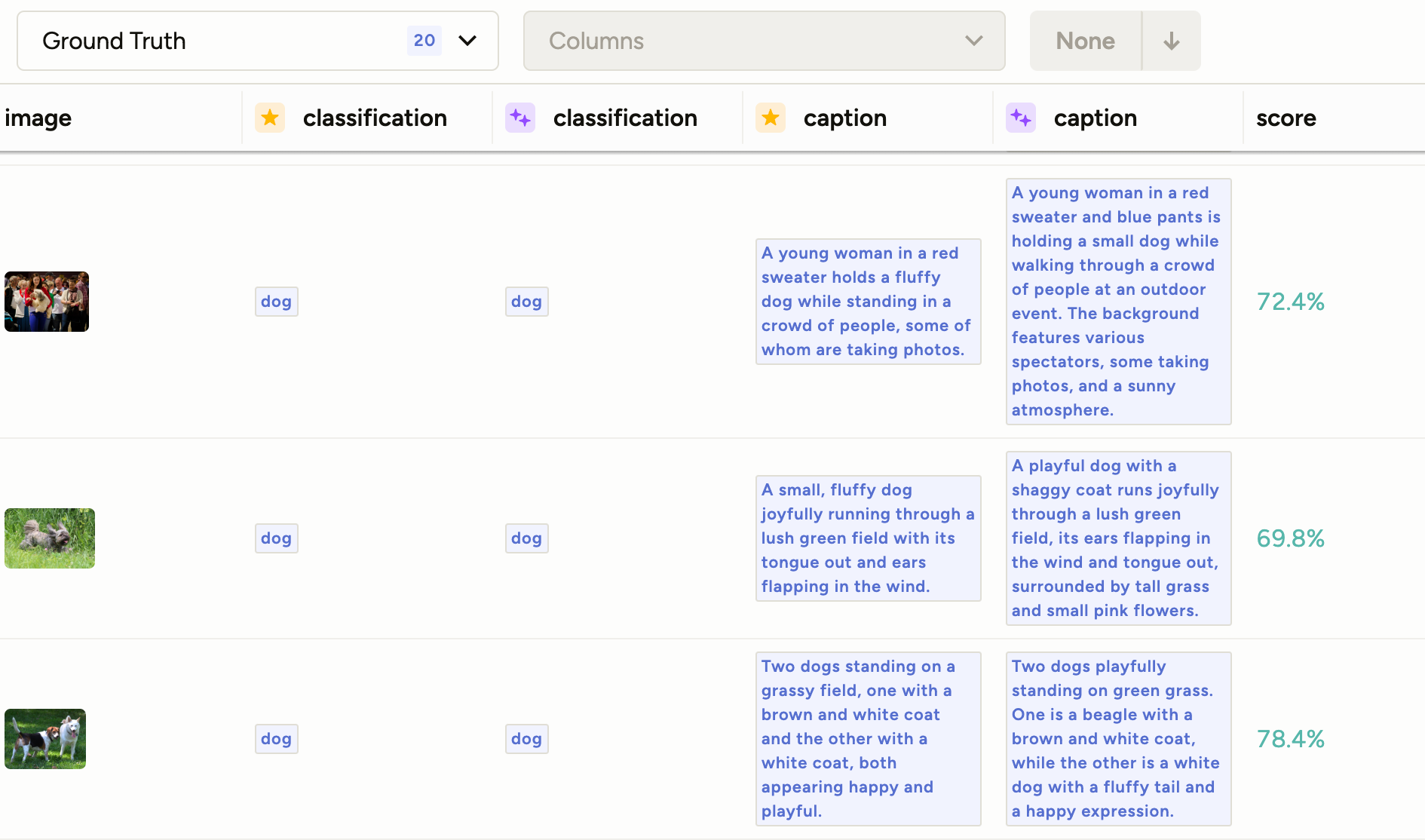
Beta features
Use AI to create projects
We’ve trained an AI on our docs to help you create projects faster. If you’d like to give it a try early, send us an email.

Feature updates
Use Taxonomy for labeling
There is a new
labelingparameter available for the Taxonomy tag. When set to true, you can apply your Taxonomy classes to different regions in text. For more information, see Taxonomy as a labeling tool.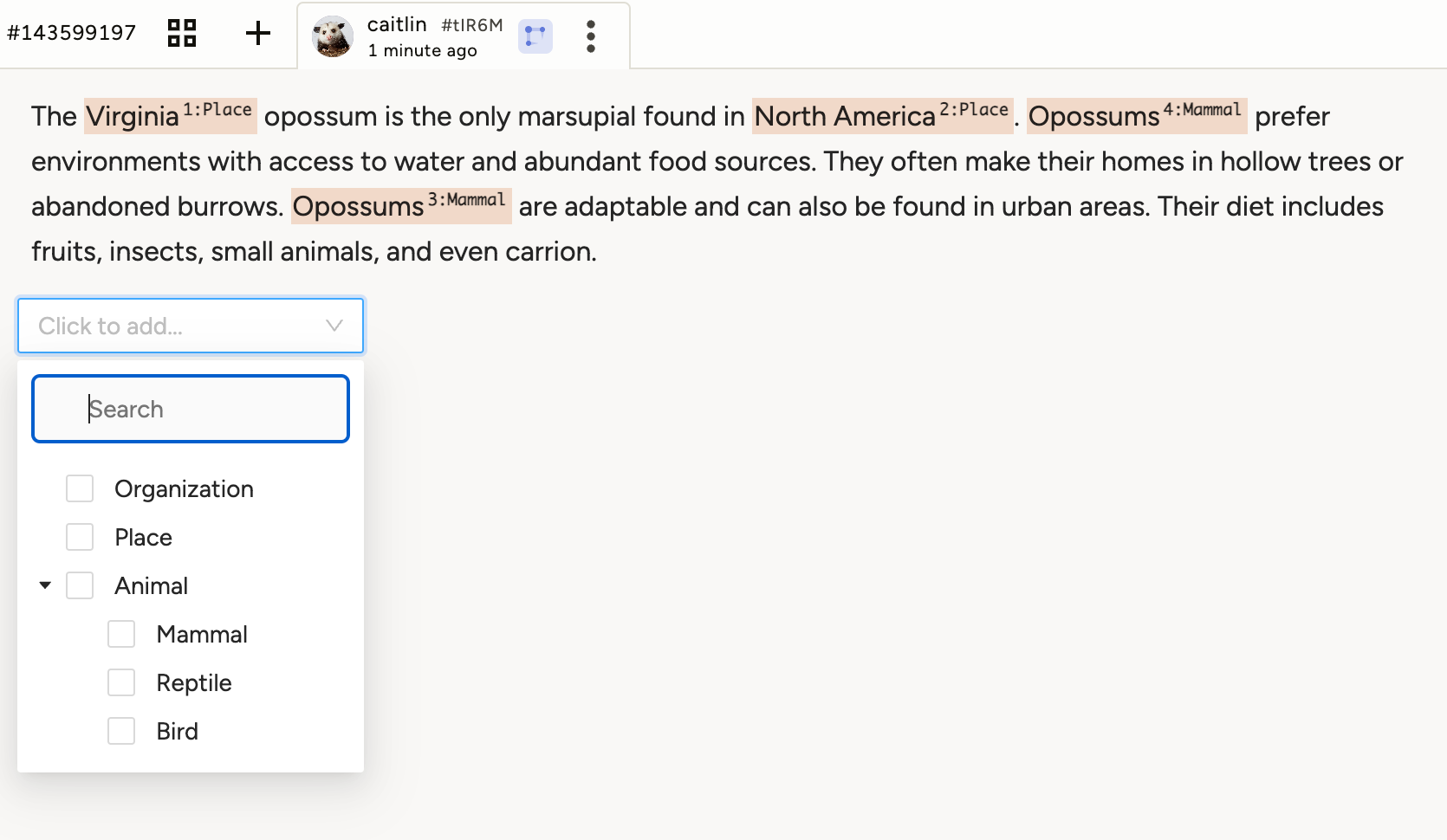
Bug fixes
- Fixed an issue where the Label Studio version as displayed in the side menu was not formatted properly.
- Fixed an issue where, in some cases, project roles were reset on SAML SSO login.
- Fixed an issue affecting Redis credentials with special characters.
- Fixed an issue where task IDs were being duplicated when importing a large number of tasks through the API.
- Fixed an issue where users were not being redirected to the appropriate page after logging in.
-
New features
Paginated multi-image labeling
Paginated multi-image labeling allows you to label an album of images within a single task. When enabled, a page navigation tool is available within the labeling interface.

While you can use paginated multi-image labeling with any series of related images, it can also be especially useful for document annotation.
For example, you can pre-process a PDF to convert it into image files, and then use the pagination toolbar to navigate the PDF. For more information, see our Multi-Page Document Annotation template.To enable this feature, use the
valueListparameter on the<Image> tag.Classification reports for Prompts
When your Prompt includes classification elements, you can now view a report that tells you how often each class was identified. This is available for the following tags:
- Choices
- Labels
- Pairwise
- Rating

Feature updates
- Several usability enhancements for Prompts, such as a descriptive header and a reordered version menu.
- Improved the inter-annotater agreement API so that it is more performant and can better handle a high number of annotators.
Bug fixes
- Fixed an issue where SSO/SAML users were not being redirected back to the originally requested URL.
- Fixed an issue where a timeout on the inter-annotator agreement API would cause missing data in the Annotator Summary table on the Members page.
- Fixed an issue where the default date format used when exporting to CSV was incompatible with Google Sheets.
- Fixed an issue where users were unable to edit meta information that they previously added to bounding box regions.
-
New features
Set task reservation time
There is a new project setting under Annotation > Task Reservation.
You can use this setting to determine how many minutes a task can be reserved by a user. For more information, see Project settings - Task Reservation.
By default, the task reservation time is set to one day (1440 minutes). This setting is only available when task distribution is set to Auto.

Feature updates
- Updated the placeholder text that users see in the labeling configuration preview.
Bug fixes
- Fixed an issue where commas in comment text breaking were causing errors when exporting to CSV from the Annotator Performance report.
- Fixed an issue where annotators were seeing a tooltip message stating that the project was not ready yet, even though the project had already been completed.
- Fixed an issue that was causing 404 errors in the Activity Log.
- Fixed an issue where users were unable to deselect tools from the toolbar by clicking them a second time.
- Fixed an issue where users were presented with Reviewer actions even if the annotation was still in Draft state.
- Fixed an issue with the Source Storage editor in which some fields were overlapping in the user interface.
- Fixed an issue with the Data Manager filters when the columns are different from those in the labeling config and when
$undefined$is present in the task data. - Fixed an issue where filter options in the Data Manager would disappear on hover.
- Fixed an issue which caused XML comments to incorrectly be considered in the label config validation.
- Fixed an issue causing an error when marking a comment as read.
- Fixed an issue where an error message would appear when selecting or unselecting the Get the latest news & tips from Heidi option on the Account Settings page.
-
New features
Flexible label configuration support for Prompts
Previously, the projects that you could use with Prompts were limited to relatively simple labeling configurations (for example, only having one set of
Choicesor one set ofLabels).With this change, you can now use complex projects with Prompts. For example, project with multiple
Choices,Labels, and a combination of both. It also adds support forTextAreaandPairwisecontrol tags.Also as part of this change, you will no longer be asked to select a project Type when creating a new Prompt.
For more information, see Create a Prompt.

Export information from the annotator performance report
There is a new Export action available from the annotator performance dashboard.
- Report - Download the information in the dashboard as CSV or JSON.
- Timeline - Download a detailed timeline of all the user's annotation actions within the timeframe, including when the began and submitted each annotation.
- Comments Received - Download a CSV file with all of the comments that other users have left on the user's annotations.

Feature updates
Edit regions when classifying video frames
We recently introduced the ability to perform video frame classification with the
<TimelineLabels>tag.You now have the ability to edit the frame spans you select in the timeline editor, making it easier to control which frames you want to label.

Improved usability on project settings pages
There are a number of project settings that are only applicable when auto distribution is enabled for users.
To prevent confusion, settings that are not applicable will be hidden when manual distribution is enabled.
This means the following settings will be hidden when Annotation > Distribute Labeling Tasks is set to Manual:
- Annotation > Task Sampling
- Quality > Overlap of Annotations
- Quality > Low Agreement Strategy
Improved TextArea look and feel
TextArea elements have been updated to reflect the look and feel of other labeling elements.

Improved error messages when using Send Test Request for connected ML backends
When using the Send Test Request action for a connected ML backend model, you will now see more descriptive error messages.
Bug fixes
- Fixed an issue in which in certain scenarios users were unable to receive a password reset email.
- Fixed an issue where project-level roles did not affect role upgrades performed at the Organization level.
-
New features
Use an LLM to help you draft Prompts
There is a new Enhance Prompt action available when writing a prompt.
You can use this feature to allow an LLM to enhance the prompt you already have, using your initial prompt and the tasks as context. For more information, see Draft and run prompts.


Feature updates
Estimate cost for Prompts
You will now see an estimated cost before running a prompt. This estimate is based on the number of tokens required:

Bug fixes
- Fixed an issue where links were not resolving when using multiple S3 storages.
- Fixed an issue where non-unicode symbols would cause the Activity Log page to not load.
- Fixed an issue that could produce duplicate accounts when synced from SCIM.
- Fixed an issue where instructions were not visible to reviewers in the Review Stream.
- Fixed an issue preventing linking comments to an audio field.
- Fixed an issue preventing linking regions in audio tasks.
- Fixed an issue where deleted annotator users were not available as option when building filters in the Data Manager.